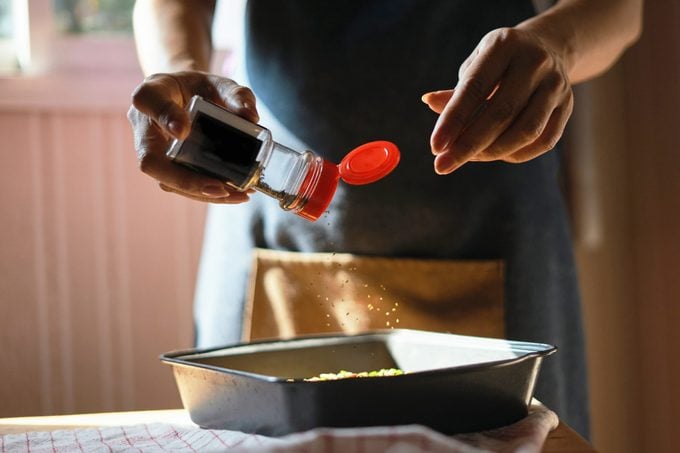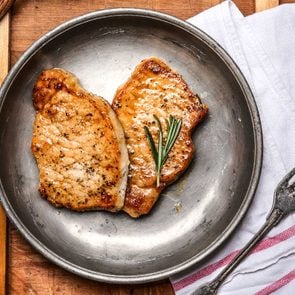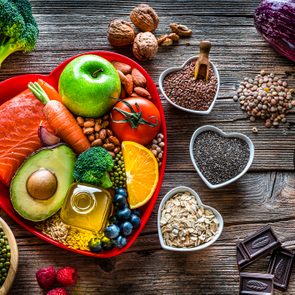9 Natural Ways to Lower Cholesterol
Updated: Apr. 07, 2023
These natural ways to lower cholesterol will go a long way toward keeping your heart healthy.
What is high cholesterol?
Lipid disorder, hyperlipidemia, hypercholesterolemia, high cholesterol—whatever you call it, it isn’t a good thing.
Cholesterol is a waxy, fat-like substance that is made in your liver and travels throughout your bloodstream. It may not sound particularly good for your body, what with the “waxy” and “fat-like” descriptors, but cholesterol does have some merit.
It’s one of the ingredients the body needs to make new cells, and it’s also essential for creating vitamin D, bile acids, and hormones such as progesterone and estrogen.
But having too much cholesterol can put you at risk for cardiovascular disease and stroke. That’s why it’s so important you know your level and, if it’s high, take action. In addition to meds, there are natural ways to lower cholesterol.
4 Best Supplements to Lower Your Blood Pressure
What causes high cholesterol?
When doctors talk about cholesterol, they’re really talking about lipoproteins. Because cholesterol is a waxy fat (a lipid), it doesn’t travel well in the blood, which is mostly water. So it joins up with protein, forming particles called lipoproteins.
Protein is denser than fat, so particles with less fat are called high-density lipoproteins (HDL), while those with more fat are called low-density lipoproteins (LDL).
When too much LDL (aka “bad” cholesterol) is in your blood, it can build up and create sticky plaques on the walls of the arteries. This makes it harder for the heart to circulate blood and oxygen. Over time, as the plaque builds up, it can increase your risk of developing atherosclerosis (clogged arteries), heart disease, or stroke.
On the flip side is HDL (“good” cholesterol), which ushers bad cholesterol back to the liver, where it is processed and flushed out of the body.
So what causes LDL to rise? There are a few primary reasons you might develop high cholesterol levels.
The Best and Worst Diets for Your Cholesterol, Says UCLA Cardiologist
Lifestyle risk factors
Cholesterol levels are largely affected by lifestyle, namely:
- A diet high in saturated fats
- Being overweight
- A sedentary lifestyle
- Smoking
Genetic risk factors
Still, there are some people whose inherited genes make them prone to higher cholesterol levels.
One rare condition, called familial hypercholesterolemia, causes very high LDL cholesterol levels and an increased risk of coronary heart disease and heart attack—both of which can happen at an early age.
However, there are other, more common genes that can also increase your risk.
The good news is that even if heart disease and high cholesterol runs in your family, there are plenty of things you can do to lower the risk, including healthy eating and consistent exercise.
Cholesterol absorption
About 15% of people are cholesterol hyper-absorbers, says Khalid Sheikh, MD, a cardiologist at Health First in Viera, Florida.
“They run high blood cholesterol levels because they have the ability to absorb more cholesterol than is healthy,” he says. “These people are at a higher risk of developing stroke and heart disease.”
This Chart Shows Healthy Cholesterol Levels by Age
Age
Another factor beyond your control is aging. Men and women may see an uptick in cholesterol numbers as they get older. In particular LDL numbers tend to trend higher in women after menopause, due in part to the decline in estrogen.
The 11 Most Frustrating Problems You Didn’t Know Are Signs of Menopause

What does your cholesterol level mean?
It’s vital to know your numbers, as high cholesterol doesn’t have any symptoms. (That’s why it’s called a silent killer.)
Adults 20 and older should have their cholesterol levels checked at least once every five years. A blood test (called a lipid panel) reveals numbers for total cholesterol, LDL, HDL, and triglycerides, another form of fat (which isn’t cholesterol) in your blood.
The following are target levels for adults.
Total cholesterol
- Healthy cholesterol level: less than 200 mg/dl
- Borderline high cholesterol level: 200 to 239 mg/dl
- High cholesterol level: 240 mg/dl and above
LDL cholesterol
- Optimal cholesterol level: less than 100 mg/dl
- Near/above optimal cholesterol level: 100 to 129 mg/dl
- Borderline high cholesterol level: 130 to 159 mg/dl
- High cholesterol level: 160 to 189 mg/dl
HDL cholesterol
- Normal cholesterol level: 50 mg/dl or higher for women; 40 mg/dl or higher for men
- Low cholesterol level: less than 40 mg/dl
Triglycerides
- Normal: less than 150 mg/dl
- Borderline High: 150 to 199 mg/dl
- High: 200 mg/dl or higher
A UCLA Heart Doctor Says the Change in Seasons Can Affect Your Cholesterol
How is high cholesterol treated?
Lifestyle changes can be instrumental in improving high cholesterol. For many, they wipe out high cholesterol entirely.
That said, a staggering 55% of adults in the United States are taking cholesterol-lowering medicine. Some people need prescription medication because of additional risk factors, such as heart disease, diabetes. Others are unable reach goal cholesterol levels with lifestyle changes alone, so they add meds to their treatment plan. And others still simply have very high LDL cholesterol—190 mg/dl or more.
The most commonly prescribed medicines are statins, which block a specific enzyme the liver needs to make cholesterol. There are also cholesterol absorption inhibitors, resins, fibrates, and PSCK9 inhibitors, which may be a good choice for people with an inherited form of high cholesterol.
Do Statins Work for Everybody? A UCLA Cardiologist Weighs In
Natural ways to lower cholesterol
Lowering cholesterol takes a multifaceted approach. It’s not enough to switch from donuts to oatmeal for breakfast or swap out butter for olive oil.
Slashing high cholesterol numbers requires you to make healthy lifestyle choices daily. That means looking at all aspects of your routine, from what to you eat and the activity you get, to bad habits you may have.
One word of warning: if you’re currently taking medication, this isn’t a time to go cold turkey. Stay with your current medication dosage and schedule. Meanwhile, try these natural ways to lower your cholesterol.
Eating This Fruit Once a Day Can Decrease Bad Cholesterol, Says New Study
Get plenty of soluble fiber
Fiber comes in two types: soluble and insoluble. Both types are an essential part of a healthy diet. But studies show that soluble fiber, found in high-fiber foods like whole grains, fruits, vegetables, seeds, and legumes, can reduce LDL cholesterol by 5 to 10%.
“Soluble fiber binds to cholesterol in the intestines and causes the cholesterol to be excreted in the stool,” says Colleen Tewksbury, PhD, MPH, RD, a senior research investigator and bariatric program manager at Penn Medicine in Philadelphia..
Insoluble fiber, on the other hand, absorbs water and other materials to form regular stools. You need both types, so be sure you get half of each, totaling about 25 to 30 grams per day.
Here’s How Often You Should Have a Bowel Movement, Says a Gastroenterologist
Eat unsaturated fats
By now, we know that we should limit saturated fats in our diets because it raises levels of bad cholesterol in the blood. But in addition to that, we should also be upping our intake of monounsaturated and polyunsaturated fats.
The unsaturated fats from foods like fatty fish, olive oil, vegetables, nuts, and seeds are much healthier for the heart.
Case in point: a study in the Journal of the Academy of Nutrition and Dietetics found that diets rich in unsaturated fats can improve overall cholesterol levels. Not only were higher intakes of polyunsaturated fats associated with healthier total cholesterol levels, but higher intakes of monounsaturated fats were linked to healthier HDL levels too.
“They improve cholesterol likely by requiring less work and leaving fewer/preferred byproducts of converting by the liver for transport to your cells,” says Tewksbury.
Interestingly, the healthiest high-fat foods you should be eating may surprise you. Eggs, for example, are well known for their high cholesterol, but the truth about eggs is that it’s the saturated fats, not the cholesterol, that causes health problems for most people.
20 Foods With Healthy Fats You Should Definitely Be Eating
Choose foods that contain plant sterols
Plant sterols (also known as phytosterols) are found in foods such as whole grains, fruits, vegetables, vegetable oil, nuts, and legumes.
“They directly block the absorption of cholesterol,” Tewksbury says.
Research published in 2018 in Nutrients indicates that consuming 1.5 to 3 grams of plant sterols per day could decrease LDL cholesterol levels by as much as 12%.
Plant sterols occur in small quantities, so food manufacturers fortify cereal, crackers, orange juice, margarine, and other products with them. Then they market the products as “heart healthy,” says Tewksbury. That means some of these so-called “heart healthy” foods are also loaded with saturated fat and sugar. Be sure to check the label and leave the ones high in saturated fat and sugar on the grocery shelf.

Sprinkle on spices to flavor food
Isn’t it a pleasant surprise to know something you’re probably already eating could help lower cholesterol? Well there’s a good chance you’re already ticking off this cholesterol to-do, at least to some degree.
Sprinkling cinnamon in your coffee or oatmeal and cooking with garlic are probably things you’re already doing—without realizing they could improve your cholesterol.
“Studies suggest consuming certain spices, such as cinnamon and garlic, can help lower cholesterol,” says Tewksbury.
Garlic has the potential to regulate slightly elevated cholesterol concentrations, while cinnamaldehyde, the active component in cinnamon, improves lipid and glucose metabolism.
What Is Cinnamon Good For? 9 Uses You Didn’t Know About
Try a plant-based diet
To bring those high cholesterol numbers down, you might want to consider transitioning to a plant-based diet.
“There is a plethora of literature supporting the use of a plant-based diet to treat and reverse multiple chronic diseases, especially heart disease and high cholesterol levels,” says Dana Hunnes, senior dietitian at the Ronald Reagan UCLA Medical Center.
That likely includes the 2019 ACC/AHA Guidelines on the Primary Prevention of Cardiovascular Disease. The guidelines stated that eating a plant-based protein diet reduced amounts of cholesterol (and sodium) compared with an animal protein diet.
Which means replacing animal proteins (think meat and poultry) with plant proteins (like tofu, beans, and quinoa) can reduce the risk of plaque buildup in the arteries, a precursor to cardiovascular disease.
8 Tofu Health Benefits You Should Know
Ditch the processed foods
Processed foods are often high in LDL-raising saturated fat. But they come with an additional warning. The trans fats, refined sugars, and carbohydrates in processed foods trigger inflammation in the body, says cardiologist Neel Chokshi, MD, medical director of the Penn Sports Cardiology and Fitness Program at Penn Medicine in Philadelphia.
“High cholesterol, in combination with inflammation, is what leads to atherosclerosis, or blockages in the walls of your arteries,” he says.
The Best Juice to Sip on To Reduce Inflammation, Says Dietitian
Exercise
You may not know this, but exercise ranks nearly as important as the food you eat when it comes to lowering cholesterol naturally. A huge body of research shows exercise reduces the unhealthy fats circulating in your blood—both LDL and triglycerides.
“Cholesterol and fats provide fuel for your body,” Dr. Chokshi says. “Exercise raises your body’s energy expenditure and, in turn, burns more of these fats.”
The key to lowering cholesterol is consistency. “We recommend at least 150 minutes of moderate-intensity activity per week, or 75 minutes of high-intensity activity per week,” he says.
Beginners can start by walking 30 minutes a day at a comfortable pace, and then build to moderate-intensity activity. Doing two, 20-minute resistance training sessions a week can also help lower cholesterol by increasing muscle mass and raising your metabolism, Dr. Chokshi adds.
These Gentle Exercises May Be the Key to a Longer Life, Say Experts
Shed some pounds
If you’re overweight or obese, aim to drop some pounds. Even a little weight loss goes a long way toward achieving lower cholesterol.
Research in Translational Behavioral Medicine found that people who lost 5 to 10% of their weight showed a reduction in total cholesterol, LDL, and triglycerides—and the numbers got even better when people lost more than that.
This Is the Best Diet for Your Heart, Says New Report
Quit smoking
The association between smoking and cholesterol is twofold. For starters, smoking makes LDL cholesterol stickier, so it clings to artery walls. Secondly, smoking lowers HDL cholesterol, which is what ushers LDL, or “bad” cholesterol out of the arteries.
Quitting can make a big difference. A review of studies found that HDL levels increase by as much as 30 percent just after three weeks of stopping smoking.
As strong as the argument to quit smoking is, it’s rarely easy to do. Dr. Chokshi says the key is to devise a personal strategy by understanding and addressing the reasons you smoke.
















